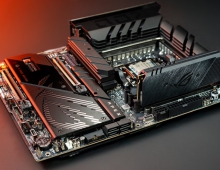
AMD to Ship First 45nm Shanghai Processors Earlier Than Schedule
AMD hopes to regain a competitive edge later this year with the release of its first 45nm server chip code-named Shanghai next month.
Originally scheduled for release in January 2009, the company prepares nine CPUs with core frequencies between 2.3-2.7GHz, Digitimes.com reported Wednesday citing sources at server makers in Taiwan.
The new CPUs will include five 2-way and four 8-way models, supporting AMD's socket F (1207), and including an on-die DDR2 memory controller and 6MB L2 cache. Shanghai processors will only support HyperTransport 1.0 initially. Models supporting HyperTransport 3.0 will be released in the second quarter of 2009.
Getting the Shanghai chips out ahead of schedule could be very good for the AMD to catch up to Intel in the 45nm and the server market race. Intel came out with its first 45nm processor family - Penryn -- last November, a year before AMD's first 45nm chip.
AMD's server processor code-named Barcelona, which was meant to stave off competition from Intel, arrived late. In addition, a bug forced the company to hold the product back from widespread use and fix it.
The new CPUs will include five 2-way and four 8-way models, supporting AMD's socket F (1207), and including an on-die DDR2 memory controller and 6MB L2 cache. Shanghai processors will only support HyperTransport 1.0 initially. Models supporting HyperTransport 3.0 will be released in the second quarter of 2009.
Getting the Shanghai chips out ahead of schedule could be very good for the AMD to catch up to Intel in the 45nm and the server market race. Intel came out with its first 45nm processor family - Penryn -- last November, a year before AMD's first 45nm chip.
AMD's server processor code-named Barcelona, which was meant to stave off competition from Intel, arrived late. In addition, a bug forced the company to hold the product back from widespread use and fix it.





















